|
|
|
Sort Order |
|
|
|
Items / Page
|
|
|
|
|
|
|
| Srl | Item |
| 1 |
ID:
184226
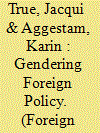

|
|
|
|
|
| Summary/Abstract |
This article seeks to explain the rise of pro-gender norms and feminist strategies in foreign policy, which are increasingly salient in global politics. How can this trend be theorized? In what ways is this development resisted and contested by other states and international actors? To what extent can we trace continuity and change in regard to gender and foreign policy? To address these major research questions and to spur cross-national comparative studies, this article advances a theoretical framework on gendering foreign policy. It draws on two strands of research, which rarely engage with one another: international feminist theory (IFT) and foreign policy analysis (FPA). We identify three ways in which comparative analysis of gender in foreign policy can be advanced: first, by highlighting the variations of pro-gender norms and enhancing the analytical assessment of cross-national trends; second, by generating a more robust explanation of the rise, embeddedness, and continuity of, as well as resistance to, pro-gender norms in foreign policy in similar and diverse contexts; and third, by examining both continuity and change in pro-gender norms in order to reveal the contestation around gender, which is at the heart of foreign policy.
|
|
|
|
|
|
|
|
|
|
|
|
|
|
|
|
| 2 |
ID:
141717
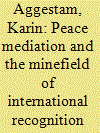

|
|
|
|
|
| Summary/Abstract |
This article analyzes the intricate dynamics between international mediation and the quest for recognition in protracted conflict. The overarching aim is two-fold: to analyze how the struggle for recognition relates to protracted conflict, and why, when and in what ways recognition poses a barrier to efficient peace diplomacy and mediation. The article explores how preferences and interests are infused with identity politics and claims for recognition. It advances three inter-related dimensions of recognition: ontological security, dignity and identity. The conceptual discussion utilizes empirical illustrations from the Israeli-Palestinian conflict. Three concluding remarks are made. First, international mediation may be accepted by negotiating parties to achieve international recognition rather than to reach an agreement. Second, due to the problem of recognition the notion of “ending conflict” can backfire in the mediation process. Third, mediators should focus on mutual, but thin recognition towards greater acknowledgement of the untenable and vulnerable positions the parties hold in conflict.
|
|
|
|
|
|
|
|
|
|
|
|
|
|
|
|
| 3 |
ID:
180831
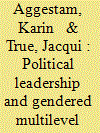

|
|
|
|
|
| Summary/Abstract |
Gender intersects as a major fault-line in increasingly polarized, contemporary global politics. Many democratic states in the global North and South have adopted pro-gender norms in their foreign policies, while other states and populist regimes have resisted the promotion of gender equality and women's rights. This article analyses how political leaders harness gender dynamics to further their power, status and authority to act in foreign policy. While scholarship on foreign policy analysis has emphasized the role of individuals, political leaders and their followers, and of two-level games balancing domestic and international pressures, we advance a novel theoretical concept: ‘gendered multilevel games’. This new concept highlights the gendered dynamics of the problem of agency and structure in foreign policy, which are generated from the interactions between the domestic, international and transnational levels, and reach within and across states. To illustrate the utility of this concept, we analyse foreign policy leadership and the variation in gendered multilevel games in four vignettes: (1) hyper-masculinity and revisionist leadership; (2) normative leadership and gendered nation-branding; (3) compassionate leadership and gendered transnational symbolism; and (4) contested leadership on pro- and anti-gender norms in foreign policy. Importantly, these empirical illustrations show how adept political leaders navigate pro- and anti-gender norms to achieve core and often divergent foreign policy goals.
|
|
|
|
|
|
|
|
|
|
|
|
|
|
|
|
| 4 |
ID:
164833
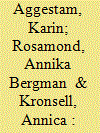

|
|
|
|
|
| Summary/Abstract |
A growing number of states including Canada, Norway and Sweden have adopted gender and feminist-informed approaches to their foreign and security policies. The overarching aim of this article is to advance a theoretical framework that can enable a thoroughgoing study of these developments. Through a feminist lens, we theorise feminist foreign policy arguing that it is, to all intents and purposes, ethical and argue that existing studies of ethical foreign policy and international conduct are by and large gender-blind. We draw upon feminist International Relations (IR) theory and the ethics of care to theorise feminist foreign policy and to advance an ethical framework that builds on a relational ontology, which embraces the stories and lived experiences of women and other marginalised groups at the receiving end of foreign policy conduct. By way of conclusion, the article highlights the novel features of the emergent framework and investigates in what ways it might be useful for future analyses of feminist foreign policy. Moreover, we discuss its potential to generate new forms of theoretical insight, empirical knowledge and policy relevance for the refinement of feminist foreign policy practice.
|
|
|
|
|
|
|
|
|
|
|
|
|
|
|
|
| 5 |
ID:
141141
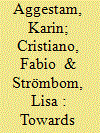

|
|
|
|
|
| Summary/Abstract |
Many contemporary conflicts are framed as antagonistic and difficult to resolve because of their zero-sum framing among the disputants. This article addresses the antagonism–agonism nexus and the political and contested nature of building peace. It has a three-fold aim: (1) to critically assess the interplay between constructive and destructive dynamics; (2) to analyse the circumstances under which conflict may move from antagonism to agonism; and (3) to advance the novel notion of agonistic peacebuilding. The Middle East Peace process is used as a critical case of intractable conflict to elucidate the enabling and restraining conditions for agonistic peacebuilding.
|
|
|
|
|
|
|
|
|
|
|
|
|
|
|
|
|
|
|
|
|